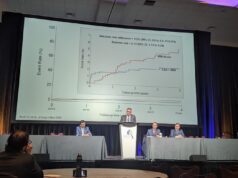
A new research letter in Stroke outlines use of the novel National Institutes of Health (NIH) ‘All of Us’ research programme dataset of diverse participant data to identify factors that increase the risk of carotid artery stenosis and those who undergo revascularisation. The study, authored by Daniela Renedo (Yale School of Medicine, New Haven, USA) and colleagues, includes electronic health record data from over 200,000 US patients.
“It is increasingly recognised that underrepresented groups defined by factors other than race and ethnicity also carry a disproportionate burden of cardiovascular disease,” the authors begin. In order to test the hypothesis that the burden of carotid artery stenosis and the proportion of persons who undergo carotid revascularisation differ in broadly defined underrepresented groups, the researchers utilised data collected via the ‘All of Us’ research programme.
According to the NIH website, the ‘All of Us’ research programme is inviting one million from across the USA “to help build one of the most diverse health databases in history,” welcoming participants from all backgrounds. “Researchers will use the data to learn how our biology, lifestyle, and environment affect health,” with the ultimate aim of finding ways to treat and prevent disease, the website adds.
The team performed a cross-sectional study including ‘All of Us’ participants with available electronic health records data, considering underrepresented groups defined by factors other than race and ethnicity, including education (less than high school degree); income (less than $35,000); and gender identity/sexual orientation.
Of the 203,813 patients included in the study, the average age was 51.5 years and the majority (61%) were female. The authors relay that the prevalence of carotid artery stenting was 2.7% (n=5,420) and the proportion of patients who underwent carotid revascularisation was 7.3% (n=395).
Writing in Stroke, Renedo et al report a key finding that persons with income of less than $US35,000 were more likely to have both carotid artery stenosis and undergo revascularisation, detailing that income of less than $US35,000 was associated with higher odds of carotid artery stenosis (odds ratio [OR], 1.15 [95% confidence interval (CI), 1.07–1.24; p=0.001] and carotid revascularisation (OR, 1.38 [95% CI, 1.04 – 1.83]; p=0.024).
The investigators also found that, when evaluating underrepresented groups defined by race and ethnicity, Black (OR, 0.87 [95% CI, 0.78–0.96], p=0.006) and Hispanic participants (OR, 0.83 [95% CI, 0.73–0.94] had a lower prevalence of carotid artery stenosis, which they note is consistent with prior reports.
Moreover, the authors communicate that Black participants with carotid artery stenosis (OR, 0.41 [95% CI, 0.24–0.68]; p=0.001) had lower estimates of carotid revascularisation. They remark that this could be explained by lower rates of high-grade stenosis, but stress that other factors should be explored further, including the potential presence of care access bias.
Renedo and colleagues acknowledge that their study may be subject to volunteer bias, leading to an increased number of healthy people enrolled. In addition, they note that not all participants chose to share their electronic health records.
“These results highlight the need to extend cerebrovascular health disparities research beyond groups defined by race/ethnicity,” the researchers conclude, adding that this goal will be “significantly facilitated” by the newly established ‘All of Us’ research programme.
Speaking to Vascular News, Renedo conveys the key takeaway message from the study, that more attention should be given to the present healthcare disparities in this condition. “Clinicians should be aware of these disparities, and offer patient-centred recommendations to prevent, mitigate and manage carotid artery stenosis across diverse populations,” she elaborates.
The first author advises that, in the near future, the ‘All of Us’ research programme will provide access to genetic data from the participants. Renedo is part of a lab team at Yale headed by Guido J Falcone that is focused on genetic epidemiology, and therefore the team will use the data from this study “to better understand the interaction between social determinants of health and biological factors that ultimately lead to carotid stenosis and its consequences.”
Renedo acknowledges the contributions of all members of the study group, namely Charles C Matouk, who jointly supervised the work with Falcone, as well as Julián N Acosta, Nanthiya Sujijantarat, Joseph P Antonios, Andrew B Koo and Kevin N Sheth.









